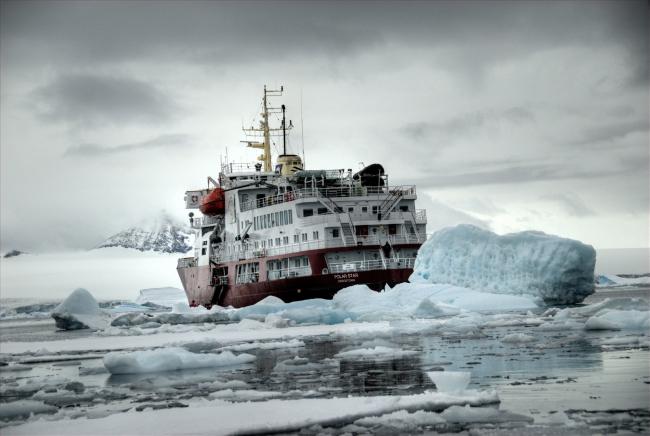Opinion: Will Seattle miss the boat for emerging arctic shipping lanes?
Wed, 02/22/2012
By Shane Harms
Tuesday night’s visiting lecture series, featuring renowned polar explorer Liv Arnesen and acclaimed educator and researcher Willy Østreng, opened with disheartening commentary about the ways the shipping industry can and are capitalizing on the sea routes opening in the Artic Ocean as the polar ice caps melt.
The most unsettling part of the talk was the Willy Østreng's seemingly genuine indifference to environmental ramifications that shipping traffic through the Arctic Ocean would cause and how he emphasized the reasons why Americans, and especially Seattleites should seize the moment this potential ecological catastrophe provides.
Østreng is a renowned researcher who has published more than 250 scientific works, including 25 books on international security, polar affairs, ocean resource management, preconditions of interdisciplinary research, and polar and ocean policy.
Currently, Østreng is an affiliate faculty at the University of Fairbanks and chairman of the research institute of Ocean Futures in Oslo.
In his speech, Østreng outlined the geopolitical aspects of what he called the “Artic Space,” or in particular the Arctic Ocean. He described the artic ocean as a military and industrial Mediterranean and that it is an economic short cut between the most industrial countries in the world. These short cuts consist of three passages: the North West passage, North East passage, and the transpolar route which goes right through the middle of the north pole seasonally. The potential in using these lanes rather than the Panama Canal and the Suez Canal is saving thousands of miles per voyage, which translates to saving money. A lot of money.
The question I had on my mind during this lecture was the cost to the environment and to the indigenous peoples of the Arctic, compared to the economic benefits to industrial countries.
I can see how a shorter route does save in fuel consumption, but is saving fuel worth plowing through one of the last pristine places on Earth in the name of commerce and resource security?
Since the ice is melting at an ever-increasing rate the shipping routes are opening up more and more as temperatures increase, which means the ice that’s there all year is getting weaker, and less apparent
especially during the summer month of September. This makes ice cutters and other ships in convoys safer in route and more efficient.
One man in the crowd asked Østreng how the shipping traffic would stress the ability for the ice to maintain it’s structural integrity, which keeping as much of the ice intact seems to be on the minds of many environmentalists and naturalists. Østreng didn’t seem to understand the question, but why should he when we are moving forward toward progress. Why preserve the ice when there is capital to be gained as the ice shelf melts and as what Østreng says, conditions in the Arctic Ocean continue to “improve for humans to do business”?
Another man declared the oil residue from the tankers and other ships would get on and in the ice, and reflect more sun-light which melts more ice faster. Østreng acknowledged that this is a problem and that interdisciplinary approaches need to be considered before commercial shipping begins, but in the same breath he reminded the audience that Russian tankers are already using the North East route.
Østreng elaborated and said, “Yes, it is possible to make money through this route.”
I think before we “take advantage” of potential expediencies in global commerce, we take a hard look at what has led to global warming in the first place. Capitalism is good, it's free, but that does not mean rampant unchecked exploitation of people and the environment should exist.
A system built on constant growth is unsustainable. Fossil fuels may or may not have only acted as a catalyst to natural occurring climate change of the Earth, but I think the bigger problem are the attitudes and values industrial cultures that have lead to the mass consumption and facilitated the temperature rise of the earth.
The Arctic Ocean ice dissipating should be viewed more as an opportunity for change in cultural patterns and values, not as new ways to expedite commercial exploitation.
Perhaps change lies in the way we read things. For example, Østreng said “Seattle is one of those cities that can benefit from development up north.”
The question is how do we develop? And should we?


